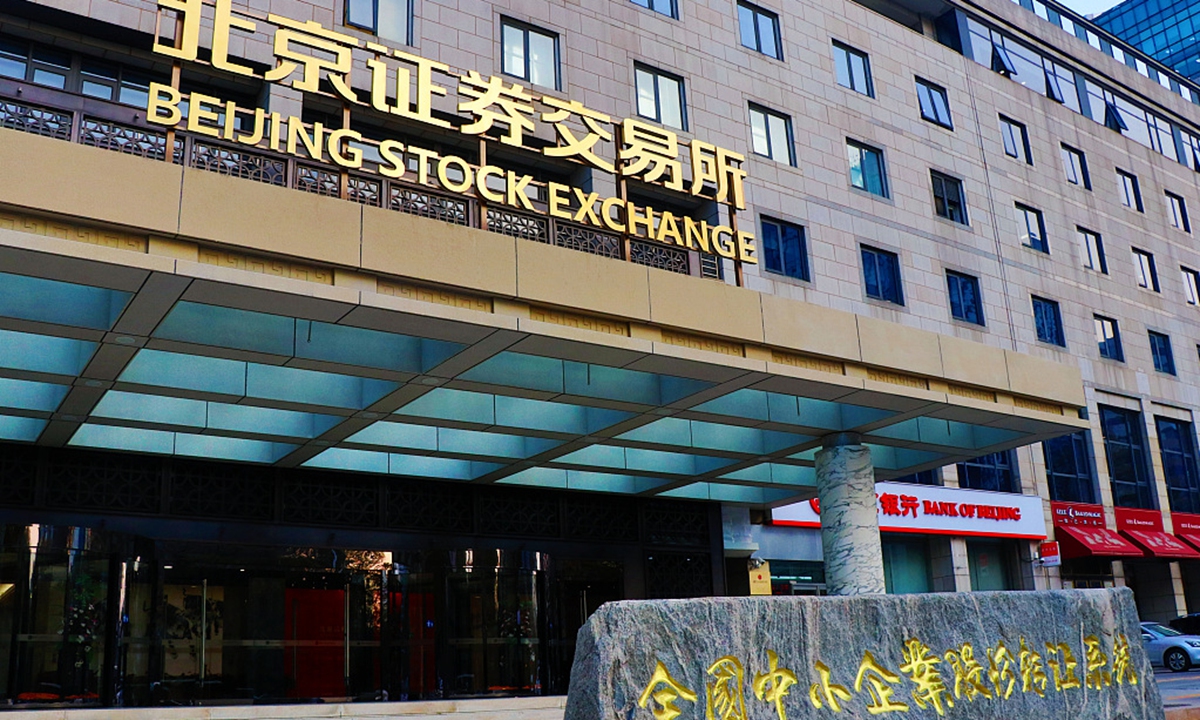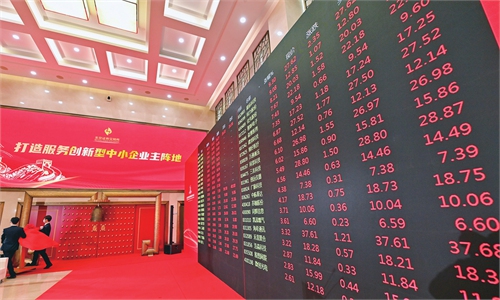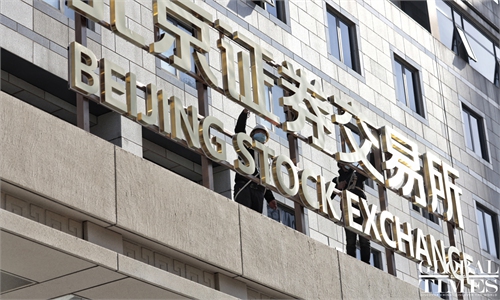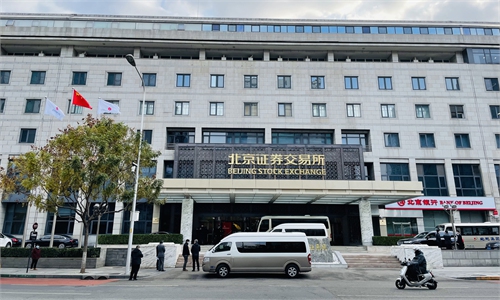Three months on, Beijing Stock Exchange operates smoothly, opening upward channel for SMEs

Beijing Stock Exchange. Photo: CFP
Three months on, the Beijing Stock Exchange (BSE) is running smoothly after finding its place in the nation's equity market, with rising transaction volume, improving trading mechanism and a lengthening listing queue.The bourse, launched on November 15 last year to ease the long-standing financing plight of small and medium-sized enterprises (SMEs), offers an upward channel for SMEs by giving full play to its system of board transfers. With more listings of high-quality companies, industry analysts said that it is likely more foreign investors will get involved in the market with promising prospects.
As of Monday, the BSE had 84 companies listed with a total market capitalization of 227.93 billion yuan ($35.85 billion). Among those companies, many - including HeBei Raisesun Information Technology and Anhui Jingsai Technology - have jumped more than 100 percent since the BSE opening.
Dai Fuhao, chairman of BSE-listed Tonghui Jiashi (Beijing) Information Technology Co, told the Global Times on Monday that the BSE has a set of more complete services compared with China's National Equities Exchange and Quotations, also known as the "new third board."
Wang Yun, board secretary of BSE-traded Welltrans O&E Co, a video surveillance supplier located in Wuhan Optic Valley, told the Global Times on Monday that for businesses, the systems of the bourse are basically perfect, providing firms with more financing tools and a better development environment.
"Further efforts are needed to attract capital and improve liquidity," said Wang.
Recently, one BSE-listed company - Skycam Defense Technology Co - successfully transferred its listing on the BSE to the Shanghai NASDAQ-style STAR Market, the first to do so.
The transfer has symbolic significance for the construction of a multi-dimensional capital market in China, according to a note by Northeast Securities.
The BSE offers a link in the transfer system - that is, it absorbs high-quality SMEs from the innovation layer of the "new third board" and delivers them to the STAR Market or ChiNext board, opening an upward channel for the SMEs.
Over the past three months, the new exchange has blossomed, with some companies launching private placements, others successfully transferring boards and some undertaking mergers and acquisitions, according to Liu Zimu, an often-cited source of insight into the New Third Board.
"In terms of IPOs, the review efficiency and intensity has been continuously improved, and the independent pricing of enterprises has been enhanced," Liu told the Global Times.
It's also possible that the new exchange will house the home-coming of overseas-listed Chinese shares and even revive plans for an international board for foreign firms to raise funds.
On January 14, Citigroup said that it established clearing and settlement services for the BSE and the "new third board" in order to facilitate foreign investment. The move enabled Citi to support Qualified Foreign Institutional Investors (QFII) to trade in the two markets. The QFII program allows overseas investors to access China's onshore markets.
In the same month, HSBC became the first international custodian bank to help a qualified foreign institutional investor complete its first stock transaction on the BSE.
Zhou Yunnan, founder of Beijing-based Nanshan Capital and a senior market commentator, said on Monday that foreign institutional investors have already bought shares of BSE-listed companies, but this process is still in the tentative stage, and there is still a long way to go before the normalization of foreign investment.
"It's necessary for the BSE to host more and larger companies, which will in turn make it easier to make a profit in the market," Zhou added.
The differentiated competition pattern between the BSE and the Shanghai and Shenzhen stock markets needs to be further shaped to enable high-quality SMEs to go public and venture capital to have an exit channel, according to Dong Shaopeng, an expert adviser for the China Securities Regulatory Commission.
"Right now, the demonstration effect in this regard is not strong enough. It is also necessary to avoid rushing for success so that the market doesn't expand too fast," Dong added.





